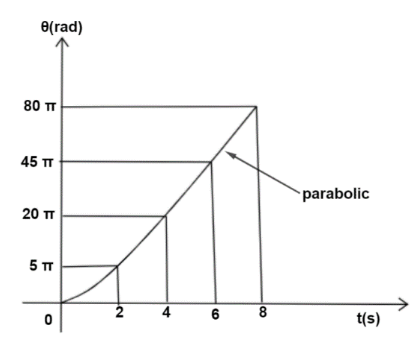
The angular displacement $\left( \theta \right)$ of the blades of a ceiling fan, when the fan is switched on at $t = 0$, is shown in figure. The average angular velocity of the fan blades during the first $8$ seconds will be

A. $40\pi {\text{ rad/s}}$
B. $20\pi {\text{ rad/s}}$
C. $10\pi {\text{ rad/s}}$
D. $5\pi {\text{ rad/s}}$

Answer
504k+ views
Hint: To solve this question the student should know what angular displacement is. Its definition, formulas and unit of angular displacement. One has to clearly observe the given graph and data to solve the question. And should know about average angular displacement.
Complete step by step answer:
The motion of the body along a circular path is known as the rotational motion and angular displacement can be defined as the shortest angle between the initial and the final position for an object in a circular motion around a fixed point is known as the angular displacement.It is a vector quantity.
The unit of angular displacement is radian or degrees.
Formula for angular displacement
$\theta = \dfrac{s}{r}$
Where, $\theta $ is angular displacement, $s$ is distance covered and $r$ is the radius of curvature.
\[{\omega _{avg}} = \dfrac{{{\text{angular displacement}}}}{{{\text{total time taken}}}}\]
\[{\omega _{avg}} = \dfrac{{\Delta \theta }}{{\Delta t}}\]
Substituting the given values,
\[ \Rightarrow {\omega _{avg}} = \dfrac{{80\pi }}{8}\]
\[ \therefore {\omega _{avg}} = 10\pi \]
Therefore, the correct answer is option C.
Note: With these types of questions, one should not forget to write the SI along with the answer. Actually angular displacement has no unit but just to avoid confusion Here the SI unit of angular displacement is given by radian or degree. And Angular velocity: The angular velocity is the rate at which displacement is changing with respect to the time in circular motion.
Complete step by step answer:
The motion of the body along a circular path is known as the rotational motion and angular displacement can be defined as the shortest angle between the initial and the final position for an object in a circular motion around a fixed point is known as the angular displacement.It is a vector quantity.
The unit of angular displacement is radian or degrees.
Formula for angular displacement
$\theta = \dfrac{s}{r}$
Where, $\theta $ is angular displacement, $s$ is distance covered and $r$ is the radius of curvature.
\[{\omega _{avg}} = \dfrac{{{\text{angular displacement}}}}{{{\text{total time taken}}}}\]
\[{\omega _{avg}} = \dfrac{{\Delta \theta }}{{\Delta t}}\]
Substituting the given values,
\[ \Rightarrow {\omega _{avg}} = \dfrac{{80\pi }}{8}\]
\[ \therefore {\omega _{avg}} = 10\pi \]
Therefore, the correct answer is option C.
Note: With these types of questions, one should not forget to write the SI along with the answer. Actually angular displacement has no unit but just to avoid confusion Here the SI unit of angular displacement is given by radian or degree. And Angular velocity: The angular velocity is the rate at which displacement is changing with respect to the time in circular motion.
Recently Updated Pages
Master Class 11 Computer Science: Engaging Questions & Answers for Success

Master Class 11 Business Studies: Engaging Questions & Answers for Success

Master Class 11 Economics: Engaging Questions & Answers for Success

Master Class 11 English: Engaging Questions & Answers for Success

Master Class 11 Maths: Engaging Questions & Answers for Success

Master Class 11 Biology: Engaging Questions & Answers for Success

Trending doubts
One Metric ton is equal to kg A 10000 B 1000 C 100 class 11 physics CBSE

There are 720 permutations of the digits 1 2 3 4 5 class 11 maths CBSE

Discuss the various forms of bacteria class 11 biology CBSE

Draw a diagram of a plant cell and label at least eight class 11 biology CBSE

State the laws of reflection of light

Explain zero factorial class 11 maths CBSE




